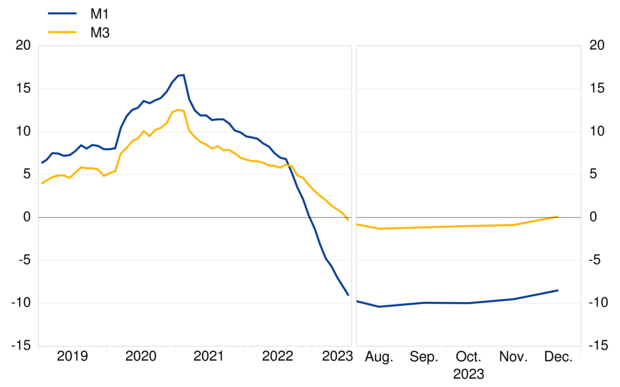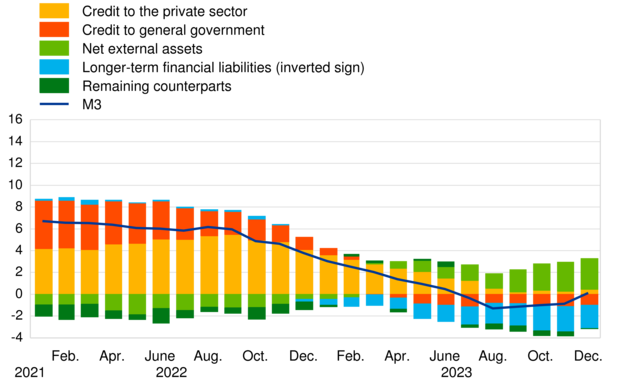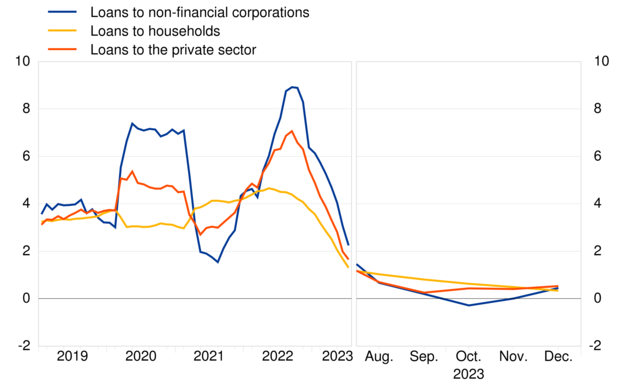
26 January 2024
Components of the broad monetary aggregate M3
The annual growth rate of the broad monetary aggregate M3 increased to 0.1% in December 2023 from -0.9% in November, averaging -0.6% in the three months up to December. The components of M3 showed the following developments. The annual growth rate of the narrower aggregate M1, which comprises currency in circulation and overnight deposits, was -8.5% in December, compared with ‑9.5% in November. The annual growth rate of short-term deposits other than overnight deposits (M2-M1) stood at 20.9% in December, compared with 20.8% in November. The annual growth rate of marketable instruments (M3-M2) increased to 19.3% in December from 17.8% in November.
Chart 1
Monetary aggregates
(annual growth rates)

Looking at the components’ contributions to the annual growth rate of M3, the narrower aggregate M1 contributed -6.0 percentage points (up from -6.8 percentage points in November), short-term deposits other than overnight deposits (M2-M1) contributed 5.1 percentage points (up from 5.0 percentage points) and marketable instruments (M3-M2) contributed 1.0 percentage points (up from 0.9 percentage points).
From the perspective of the holding sectors of deposits in M3, the annual growth rate of deposits placed by households increased to 0.2% in December from -0.3% in November, while the annual growth rate of deposits placed by non-financial corporations was -0.9% in December, compared with ‑1.9% in November. Finally, the annual growth rate of deposits placed by non-monetary financial corporations (excluding insurance corporations and pension funds) was -4.2% in December, compared with -8.3% in November.
Counterparts of the broad monetary aggregate M3
As a reflection of changes in the items on the monetary financial institution (MFI) consolidated balance sheet other than M3 (counterparts of M3), the annual growth rate of M3 in December 2023 can be broken down as follows: net external assets contributed 2.8 percentage points (up from 2.7 percentage points in November), credit to the private sector contributed 0.4 percentage points (up from 0.3 percentage points), credit to general government contributed -1.0 percentage points (up from -1.1 percentage points), longer-term financial liabilities contributed -2.1 percentage points (up from ‑2.3 percentage points), and the remaining counterparts of M3 contributed 0.0 percentage points (up from -0.4 percentage points).
Chart 2
Contribution of the M3 counterparts to the annual growth rate of M3
(percentage points)

Data for contribution of the M3 counterparts to the annual growth rate of M3
Credit to euro area residents
As regards the dynamics of credit, the annual growth rate of total credit to euro area residents was ‑0.4% in December 2023, compared with -0.6% in the previous month. The annual growth rate of credit to general government was -2.5% in December, compared with -2.8% in November, while the annual growth rate of credit to the private sector increased to 0.5% in December from 0.3% in November.
The annual growth rate of adjusted loans to the private sector (i.e. adjusted for loan sales, securitisation and notional cash pooling) stood at 0.5% in December, compared with 0.4% in November. Among the borrowing sectors, the annual growth rate of adjusted loans to households decreased to 0.3% in December from 0.5% in November, while the annual growth rate of adjusted loans to non-financial corporations increased to 0.4% in December from 0.0% in November.
Chart 3
Adjusted loans to the private sector
(annual growth rates)

Data for adjusted loans to the private sector
Notes:
- Data in this press release are adjusted for seasonal and end-of-month calendar effects, unless stated otherwise.
- “Private sector” refers to euro area non-MFIs excluding general government.
- Hyperlinks in the main body of the press release and in annex tables lead to data that may change with subsequent releases as a result of revisions. Figures shown in annex tables are a snapshot of the data as at the time of the current release.






